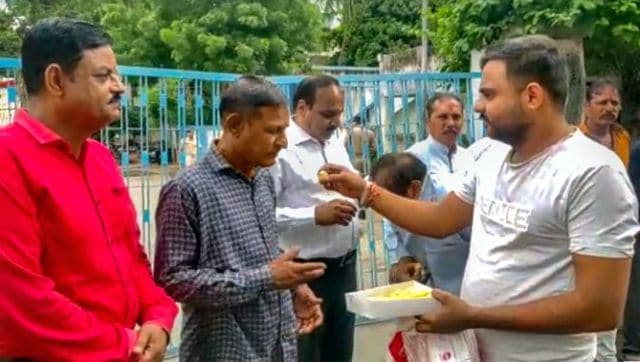“I have wept tears of relief. I have smiled for the first time in over a year and half. I have hugged my children. It feels like a stone the size of a mountain has been lifted from my chest, and I can breathe again,” said Bilkis Bano on Monday (8 January) after the Supreme Court ordered the 11 men, who were convicted of raping her and then killing her family, to return to jail within two weeks’ time.
It was a moment of relief for her when a bench of Justice B V Nagarathna and Justice Ujjal Bhuyan in their judgment stated that the Gujarat government did not have the authority or jurisdiction to consider the remission applications of the convicts and that they would have to surrender to the jail authorities.
But what happens next to the 11 convicts? Will they be able to appeal the Supreme Court’s judgment? What awaits them?
Apply for fresh remission
The 11 men, who were convicted in the 2002 Bilkis Bano gang rape case, walked out of prison in August 2022 after the Gujarat government granted them remission. However, that decision has now been struck down by the Supreme Court and they have been ordered to surrender to jail within two weeks.
Now, these 11 convicts have a few options before them – one of them being approaching the Maharashtra government with request for remission of their sentences. But why Maharashtra, you may ask? The apex court has held that only the Maharashtra government where the trial was relocated to Mumbai due to safety concerns, could consider such requests in the Bilkis Bano case.
And with that now all eyes turn to Maharashtra. Interestingly, Maharashtra has its own remission policy. According to the state’s 2008 policy, the minimum sentence prior to any remission is at least 18 years.
However, the policy has a separate clause for brutal crimes against women, under which convicts would be eligible for remission only after serving 28 years in prison. According to a report in Bar and Bench, it is this clause that is most likely to apply to the 11 convicts in this case. And what this means is that the men would have to be behind bars for at least another 12 years – until 2036.
The report by Bar and Bench further stated that even if the state applies the previous 1992 policy for the 11 convicts, remission in matters of sexual assault would be possible only after serving a minimum of 22 years and the same can go up to 28 years if the case involves exceptional violence or perversity. This means that the 11 men would be eligible for release only after 2030 or 2036 respectively.
A review petition
However, this is not the only option that the 11 convicts have before them. Besides moving the Maharashtra government for remission, the men can also file a review petition before the Supreme Court. However, it’s important to note that the apex court doesn’t entertain every review petition that is filed.
It’s even more important to note that a review petition has to be filed within 30 days of the judgment and will be heard by the same bench, which had passed the judgment. Also, a review petition can be filed only on three grounds:
1) Discovery of any new information or evidence
2) On account of some mistake or error apparent on the face of the record
3) Any other sufficient reason as the Court may deem fit
A look back at the Bilkis Bano case
On Monday, the Supreme Court hearing PILs against the early release of the 11 convicts in the Bilkis Bano case quashed the Gujarat government’s order, saying the state of Gujarat had “usurped the powers of the state of Maharashtra which only could have considered the applications seeking remission”.
Additionally, the judges said that the convicts were considered for an early release on the basis of the 1992 Gujarat policy, which could not have been applied to them.
Reacting to the apex court’s order, Bilkis through a note provided by her advocate said, “This is what justice feels like. I thank the honourable Supreme Court of India for giving me, my children and women everywhere, this vindication and hope in the promise of equal justice for all.”
Bilkis was five-months pregnant in 2002 when she fled from Gujarat’s Randhikpur, her village, with her three-and-a-half-year-old daughter and 15 other family members after the Sabarmati train was burnt in Godhra. On moving, she and her family were attacked by about 20-30 people armed with sickles, swords, and sticks.
What followed was even more heinous; Bilkis, her mother, and three other women were raped and brutally assaulted while her three-year-old daughter was among the seven family members who were killed.
Two years later, in 2004, the accused in the case were arrested and the trial began in Ahmedabad. However, after Bilkis expressed apprehensions that witnesses could be harmed and the evidence collected by the CBI tampered with, the apex court transferred the case to Mumbai.
On 21 January 2008, the Special CBI Court sentenced 11 accused to life imprisonment on the charges of conspiring to rape a pregnant woman, murder and unlawful assembly under the Indian Penal Code. The court acquitted seven other accused for lack of evidence. One of the accused had died during the trial.
The court held that Jaswantbhai Nai, Govindbhai Nai, and Naresh Kumar Mordhiya (deceased) had raped Bilkis, while Shailesh Bhatt had killed her daughter, Saleha, by “smashing” her on the ground. Others who were convicted are Radheshyam Shah, Bipin Chandra Joshi, Kesarbhai Vohania, Pradeep Vohania, Bakabhai Vohania, Rajubhai Soni, Nitesh Bhatt, Ramesh Chandana, and Head Constable Somabhai Gori.
In May 2017, the Bombay High Court had then upheld the life sentences.
With inputs from agencies
Link to article –
Bilkis Bano’s rapists ordered to return to prison: Why this isn’t the end of the matter





